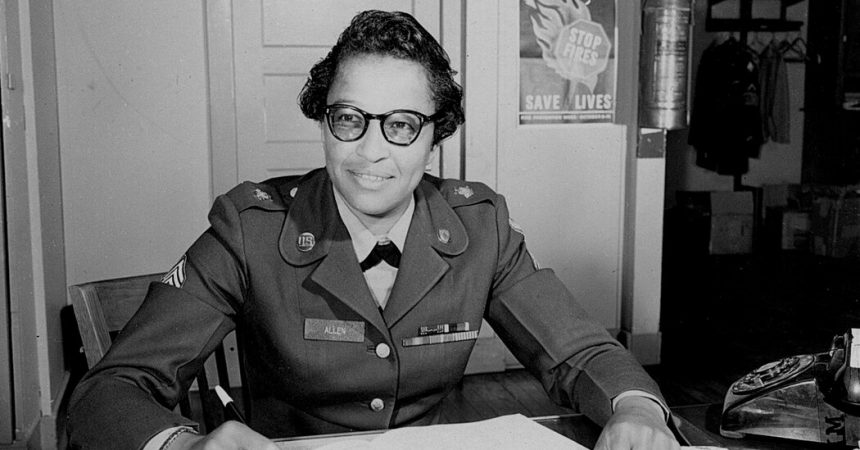Doris Allen, an Army intelligence analyst during the Vietnam War whose warning about the impending attacks in early 1968 by North Vietnamese and Viet Cong forces that became known as the Tet offensive was ignored by higher-ups, died on June 11 in Oakland, Calif. She was 97.
Her death, in a hospital, was confirmed by Amy Stork, chief of public affairs for the Army Intelligence Center of Excellence.
Specialist Allen, who enlisted in the U.S. Army’s Women’s Army Corps in 1950, volunteered to serve in Vietnam in 1967, hoping to use her intelligence training to save lives. She had been the first woman to attend the Army’s prisoner of war interrogation course and worked for two years as the strategic intelligence analyst for Latin American affairs at Fort Bragg, N.C., now Fort Liberty.
Working from the Army Operations Center in Long Binh, South Vietnam, Specialist Allen developed intelligence in late 1967 that detected a buildup of at least 50,000 enemy troops, perhaps reinforced by Chinese soldiers, who were preparing to attack South Vietnamese targets. And she pinpointed when the operation would start: Jan. 31, 1968.
In an interview for the book “A Piece of My Heart: The Stories of 26 American Women Who Served in Vietnam” (1986), by Keith Walker, Specialist Allen recalled writing a report warning that “we’d better get our stuff together because this is what is facing us, this is going to happen and it’s going to happen on such and such a day, around such and such a time.”
She said she told an intelligence officer: “We need to disseminate this. It’s got to be told.”
But it wasn’t. She pushed for someone up the chain of command to take her report seriously, but no one did. On Jan. 30, 1968 — in line with what she predicted — the enemy surprised American and South Vietnamese military leaders with the size and scope of their attacks.
U.S. and South Vietnamese forces sustained heavy losses early on before later repelling the attacks. It was a turning point in the war, further undermining American public support for it.
The Army’s refusal to take Specialist Allen’s analysis seriously suggested to her that she was viewed with prejudice, as a Black woman who was not an officer. She was one of about 700 women in the corps, known as WACs, serving in intelligence positions during the Vietnam era, and only 10 percent were Black.
In 1991, she told Newsday, “My credibility was like nothing: woman — Black woman, at that.”
In 2012, she told an Army publication: “I just recently came up with the reason they didn’t believe me — they weren’t prepared for me. They didn’t know how to look beyond the WAC, Black woman in military intelligence. I can’t blame them. I don’t feel bitter.”
Lori S. Stewart, a civilian military intelligence historian for the Army Intelligence Center of Excellence, said in an email that Specialist Allen’s analysis was not the only one that went unheeded.
“Both national and theater-level organizations believed an enemy offensive was likely sometime around the Tet holiday,” she wrote, but “too many conflicting reports and preconceptions led leaders to misread the enemy’s intentions.”
Regarding Specialist Allen, Mrs. Stewart added, “Like many other intelligence personnel in country, she was a diligent and observant intelligence analyst doing what she was supposed to do: evaluate the enemy’s intentions and capabilities.”
Specialist Allen was inducted into the Military Intelligence Corps Hall of Fame in 2009.
Doris Ilda Allen was born on May 9, 1927, in El Paso to Richard and Stella (Davis) Allen. Her mother was a cook, and her father was a barber.
Ms. Allen graduated from Tuskegee Institute (now University) in 1949 with a bachelor’s degree in physical education. She taught at a high school in Greenwood, Miss., and enlisted in the Women’s Army Corps the next year.
After basic training, she auditioned for the WAC Band, playing trumpet. But she and two other Black woman were told afterward by a chief warrant officer that “they couldn’t have any Negroes in the band,” she recalled in “A Piece of My Heart.”
She served in a number of roles over the next dozen or so years: as an entertainment specialist, organizing soldiers shows; the editor of the military newspaper for the Army occupation forces in Japan during the Korean War; a broadcast specialist at Camp Stoneman, Calif., where her commanding officer was her sister, Jewel; a public information officer in Japan; and an information specialist at Fort Monmouth, N.J.
In the early 1960s, Specialist Allen learned French at the Defense Language Institute and completed her training in the prisoner of war interrogation course at Fort Holabird, Md. She completed interrogation and intelligence analyst courses at Fort Bragg.
After asking to go to South Vietnam, she arrived in October 1967 for the first of her three tours of duty there.
“I had so many skills, so much education and training being wasted in various posts around the country that I decided I wanted to make a difference in a high-action post like Vietnam,” she told Lavender Notes, a publication for older LGBTQ+ adults, in 2020.
She left no immediate survivors.
Specialist Allen’s Tet analysis was not the only warning of hers to go unheeded. She advised a colonel not to send a convoy to Song Be, in southern South Vietnam, because of a possible ambush, which occurred. Five flatbed trucks were blown up; three men were killed and 19 wounded.
But she was listened to when she warned in early 1969 that the North Vietnamese had placed scores of 122-millimeter rockets around the perimeter of the Long Binh operations center, northeast of Saigon, and that they were to be used in a major attack. She wrote a memo that led to an airstrike that destroyed the rockets.
Later that year, Specialist Allen learned that the North Vietnamese were planning to use 82-millimeter chemical rounds. She wrote a report that saved as many as 100 Marines, who had been instructed in her memo to avoid any contact with them when they fell in their area; they later exploded. A grateful colonel sent a memo suggesting that whoever had written the report deserved the Legion of Merit.
Specialist Allen did not receive that decoration but did earn a Bronze Star with two oak clusters, among many awards. She left South Vietnam in 1970 after seeing a stolen enemy document with her name on a list of targets to kill.
After serving 10 more years in the Army she retired as a chief warrant officer.
By then she had received her master’s degree in counseling from Ball State University in Indiana in 1977. After her military service, she worked with a private investigator, Bruce Haskett, whom she had met when they were in counterintelligence. She earned a Ph.D. in clinical psychology from the Wright Institute in Berkeley, Calif., in 1986, and mentored young psychologists.
“She was incredibly savvy about people and had an innate ability to size people up quickly,” Mr. Haskett said in an interview. “See was the kind of person who could walk into a pit of vipers and have everybody eating out of her hands in 15 minutes.”
Christina Brown Fisher contributed reporting.







